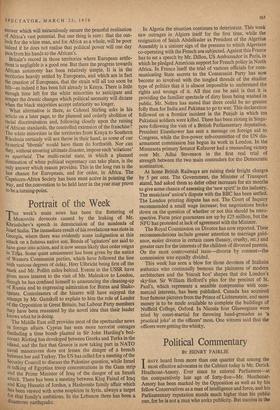Portrait of the Week
THE week's main news has been the fluttering of Muscovite dovecots caused by the leaking of Mr. khrushchev's speech in denunciation of the misdeeds of Josef Stalin. The immediate result of his revelations was riots in Georgia, where there was evidently some indignation at this attack on a famous native son. Bands of 'agitators' are said to have gone into action, and it now seems likely that order reigns in Tiflis. Some quiet amusement has been given by the antics of Western Communist parties, which have followed the line with various degrees of delay, Herr Ulbricht being first off the mark and Mr. Pollitt miles behind. Events in the USSR have given more interest to the visit of Mr. Malenkov to London. though he has confined himself to announcing the cleaning-up of Russia and to expressing admiration for Burns and Shake- speare. Connoisseurs of the bizarre will have enjoyed the attempt by Mr. Gaitskell to explain to him the role of Leader of the Opposition in Great Britain, but Labour Party members May have been reassured by the novel idea that their leader knows what he is doing.
The Middle East still provides most of the spectacular news In foreign affairs. Cyprus has seen more terrorist outrages (Including a time bomb planted in Sir John Harding's bed- room). Rioting has developed between Greeks and Turks in the island, and the fact that Greece is now taking part in NATO naval manoeuvres does not lessen the danger of a breach between her and Turkey. The US has called for a meeting of the Security Council to discuss the Palestine question, while Israel Is talking of Egyptian troop concentrations in the Gaza strip and the Prime Minister of Iraq of the danger of an Israeli attack. There has been a meeting between King Faisal of Iraq and King Hussein of Jordan, a Hashemite family affair which has been viewed with some suspicion in Syria, always a target for that family's ambitions. In the Lebanon there has been a disastrous earthquake. In Algeria the situation continues to deteriorate. This week saw outrages in Algiers itself for the first time, while the resignation of Saiah Abdelkader as President of the Algerian Assembly is a sinister sign of the pressure to which Algerians co-operating with the French are subjected. Against this France has to set a speech by Mr. Dillon, US Ambassador in Paris, in which he pledged American support for French policy in North Africa. In France itself the trial of various officials for com- municating State secrets to the Communist Party has now become so involved with the tangled threads of the shadier type of politics that it is almost impossible to understand the rights and wrongs of it. All that can be said is that it is providing the familiar spectacle of dirty linen being washed in public. Mr. Nehru has stated that there could be no greater folly than for India and Pakistan to go to war. This declaration followed on a frontier incident in the Punjab in which ten Pakistani soldiers were killed. There has been rioting in Singa- pore following the visit of a British Parliamentary deputation. President Eisenhower has sent a message on foreign aid to Congress, while the five-power sub-committee of the UN dis- armament commission has begun its work in London. In the Minnesota primary Senator Kefauver had a resounding victory over Mr. Adlai Stevenson in the first real trial of strength between the two main contenders for the Democratic nomination.
At home British Railways are raising their freight charges by 5 per cent. The Government. the Minister of Transport stated, had asked them to defer other increases for six months to give some chance of assessing the 'new spirit' in the industry. The musicians' union's dispute with the BBC has been settled. The London printing dispute has not. The Court of Inquiry recommended a small wage increase; but negotiations broke down on the question of whether or not this should be retro- spective. Farm price guarantees are up by £25 million, but the NFU has protested at lack of agreement with the Minister.
The Royal Commission on Divorce has now reported. Their recommendations include greater attention to marriage guid- ance, easier divorce in certain cases (lunacy, cruelty, etc.) and greater care for the interests of the children of divorced parents. On the most controversial issue—divorce by consent—the commission was equally divided.
This week has seen a blow for those devotees of Stalinist esthetics who continually bemoan the plainness of modern architecture and the 'biscuit box' shapes that dot London's sky-line. Sir William Holford's plan for the precinct of St. Paul's, which represents a sensible compromise with com- mercial interests, has been published. Canada has acquired four famous pictures from the Prince of Lichtenstein, and more money is to be made available to complete the buildings of Nuffield College, Oxford. In Nicosia four Glaswegians were tried by court-martial for throwing hand-grenades as 'a practical joke' at the officers' mess. One witness said that the officers were getting the whisky.


































 Previous page
Previous page